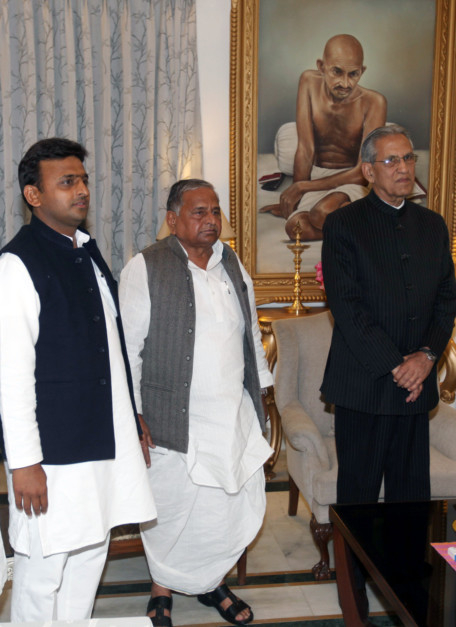
The ruling of the Election Commission of India, handing over the Samajwadi Party (SP) symbol to the incumbent Chief Minister of Uttar Pradesh (UP), Akhilesh Yadav, has come as a blow to his father and party patriarch Mulayam Singh Yadav, who had created the socialist outfit 25 years ago.
The decision was a result of a long-drawn family feud over the control of the party, the seeds of which were sown in 2012. After SP won the elections in 2012, Mulayam crowned Akhilesh — born to Mulayam’s first wife Malati Devi — Chief Minister, while persuing his national ambitions. This decision led to brewing of discontent, especially among Mulayam’s brother Shivpal Yadav, considered a master strategist and popular leader, and Mulayam’s second wife Sadhna Gupta, who was keen to protect the interests of her son Pratik and daughter-in-law Puja.
The family feud of the Yadav’s can be compared to the epic Mahabharata, where the sons of two brothers fought over the right to inherit the kingdom, which eventually led to the battle of Kurukshetra (in present-day Haryana) between the Pandavas and the Kauravas and the fall of the family. In Mahabharata, the battle was also hinged upon the role of Lord Krishna, the Hindu deity — a role that is aptly being played in the Yadav family saga by Mulayam’s cousin Ram Gopal Varma, who has sided with Akhilesh against the other members of his clan.
The role of Shakuni, who acted as a catalyst in the epic, is being played by SP leader Amar Singh, who is believed to have provoked both Shivpal and Sadhna to poison Mulayam against Akhilesh.
The Yadav family saga is not only a reflection of the Mahabharata but also that of the epic Ramayana, which also started as a family feud between the many wives of King Dasharatha, Rama’s father. His wives wanted to oust Rama from inheriting the throne and protect the interest of their respective sons. Rama was asked to undergo 14 years of penance and spend his life in a forest along with his wife Sita, away from the materialist comforts of the kingdom.
Akhilesh, who is being hailed as Rama in various posters that have been put up by his supporters, has to still undergo the test of polls starting next month. The real battle has just started for him, as an electoral loss will also ensure his exit from the party and draw the curtains on his short political career. In this political battle, like the 18-day battle of Kurukshetra, Akhilesh’s main adversaries are his father, uncle and his step brother who would like to ensure his defeat.
Poor performance at the hustings
Akhilesh, is also being likened to Aurangzeb, the sixth Mughal Emperor of India, who had imprisoned his father emperor Shah Jahan and took over the reins of power. How history will eventually judge Akhilesh and whether he will be hailed as Rama or admonished as Aurangzeb should be of least concern to him now. His priority is to hold on to power and ensure that his father and uncle are not able to oust him using his poor performance at the hustings as an excuse. Until then, the battle is only half won by him.
Akhilesh, who was considered a rookie in Indian politics even a few years ago, has undertaken a mammoth task of trying to single-handedly win the polls in India’s most populous state. An electoral loss post the family saga could mean the end of the road for him, as the clan will solely blame him for defeat.
However, to win this epic battle, he has to focus more on the spreadsheet of caste, creed and religious identity that still define the politics of UP.
Though Akhilesh wants to focus on his developmental politics that he wants to unleash on the state, he has to ensure that the party holds on to the critical Muslim-Dalit vote bank that his father had engineered years ago. Any split either in favour of the Bahujan Swamaj Party or the Bharatiya Janata Party will only ensure that the wheels of his hard-earned ‘cycle’ — the SP’s party symbol — will get deflated on March 11, the day of the results.
Also to Akhilesh’s disadvantage, Shivpal, considered to have very effective networking with booth-level party workers, is at loggerheads with the former and he will use all his might to ensure his fall.
Also, there are a large number of Mulayam loyalists within the party who may also try to sabotage Akhilesh’s eise as many believe that Akhilesh has wronged his father who brought him up to this level.
However, the last word in this family saga certainly belongs to Mahabharata, where, at the end of the war, all were left in remorse — a lesson that the Yadavs can well learn.
Archisman Dinda is a journalist based in Kolkata, India.











